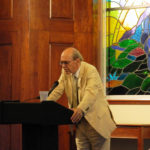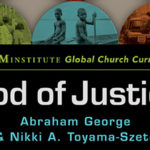In Search of the Common Good: Christian Fidelity in a Fractured World
By Jake Meador (IVP)
Jake Meador opens In Search of the Common Good with a haunting account of a botched suicide and the life that transpired thereafter. It is a hopeful story.
 From this introduction, Meador dives into a startling indictment of the American church as complicit with celebrity culture. He claims the moral failings of the American church result from its success in doing what it was designed to do—to be prominent and powerful.
From this introduction, Meador dives into a startling indictment of the American church as complicit with celebrity culture. He claims the moral failings of the American church result from its success in doing what it was designed to do—to be prominent and powerful.
The same failing of the church is seen in American society as a whole. The chaos and breakdown of society and its communities isn’t a failing but is the achieving of the system so ordered.
A church weakened by its success at worldliness is less and less a source of the “social capital” needed to hold communities together, Meador asserts. Communal bonds built on families, neighborhoods and civic organizations begin to fray, as Meador points out.
So, where’s the hope?
Meador explores hollow responses, starting with modern existentialism and following with capitalism.
In his telling, existentialism promises individual freedom but lacks anything to foster the common good because any tie to another person impinges on individual freedom. As a result, boredom runs rampant as people become overcome by a sense of self-imprisonment.
Capitalist economics promises to overcome the ills of the world but instead works against community and the common good in favor of efficiency and profitability.
To combat the diminishment of community and the common good, Meador recommends a return to the primacy of regular corporate worship, including on Sunday evenings. Corporate worship is just one expression of the larger Christian community, which is built on membership and mutual responsibility. By contrast, modern community is predicated on transactional relationships and usefulness. Marriage and celibacy come up in the context of Meador’s treatment of Christian community.
Sign up for our weekly edition and get all our headlines in your inbox on Thursdays
Another means of combating a reduced common good is to remember the goodness of work. Meador asserts that everyone is born into wealth—creation itself—and that the human task is to produce more wealth—not money, but more creation. In response to the primacy of technique and technology in modern markets, humans should appreciate the goodness of inefficiencies and work for human flourishing.
One of Meador’s most interesting discussions happens at the end of the book when he takes on politics. Instead of forming people grounded by doctrine, the American church has given too much attention to policy-making, with the result that Christians too often are tossed and turned by every change in or challenge to policy. Meador criticizes Democrats and Republicans alike and calls for the formation of three party-neutral political doctrines—solidarity, sphere sovereignty and subsidiarity—and two Christian virtues—humility and wisdom.
In the final chapter, Meador challenges the notion that the present world will be destroyed to make way for heaven. Instead, he asserts the present world—along with all its members and the good that membership has produced—will be restored into a new creation.
Eric Black, executive director/editor/publisher
Baptist Standard .














We seek to connect God’s story and God’s people around the world. To learn more about God’s story, click here.
Send comments and feedback to Eric Black, our editor. For comments to be published, please specify “letter to the editor.” Maximum length for publication is 300 words.